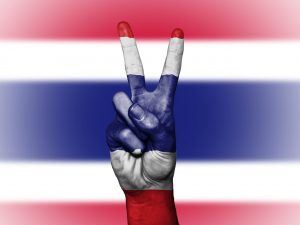Thai political activists held small protests Monday outside the prime minister’s offices and an army installation, seeking to sustain momentum from a surprisingly large anti-government demonstration on Saturday.
The weekend protest in Bangkok, which drew more than 2,000 people, represented a revival of a movement that had been gathering steam until the coronavirus pandemic hit and a state of emergency declared to deal with it made political organizing virtually impossible by mid-March.
The protest movement is in broad agreement on a set of pro-democracy demands that were presented Saturday in Bangkok, including a new constitution, new elections, and an end to repressive laws. Smaller but spirited demonstrations were held in at least two other Thai cities.
Monday’s protests were modest in comparison.
A representative of a student group named the “New Life Network” criticized what he said was the government’s inability to adequately manage the economy during the coronavirus outbreak. Pumiwat Rangkasiwit said if the government of Prime Minister Prayut Chan-o-cha cannot deal with the situation, it should step down.
Pumiwat declared to reporters outside Government House that he was beginning a hunger strike to back the demands for reforms, though he left the venue soon after. There have been no notable hunger strikes in Thailand since the 1990s, when an earlier generation of pro-democracy activists took to the streets.
A separate group of several dozen protesters held a rally Monday outside of army headquarters, where a series of speakers decried Prayut’s government and its efforts to muzzle its critics.
“If the government does not want to have instability, if the government does not want to see street protests, it should dissolve Parliament now and let the people make a decision again,” said Parit Chiwarak, a student activist from Bangkok’s Thammasat University known by the nickname Penguin.
Prayut as army commander came to power in 2014 after ousting an elected government. He became prime minister again last year after a pro-military party was able to form a coalition government following a general election.
Many critics of the government feel the established powers have bent democratic principles to their will to shut out dissenting voices.
Prayut’s military regime passed laws giving its allies an advantage in last year’s polls, and in February this year, a court ordered the dissolution of a popular opposition political party whose democracy-promoting policies had attracted substantial support among younger Thais. The court’s action triggered a string of student protests that were cut short by the coronavirus crisis.
The military holds a privileged position in Thai politics, largely because of its frequently demonstrated ability to stage coups. The army justifies its influence by claiming the mantle of protector of the country’s constitutional monarchy, which is treated as a near sacred institution.
Thai media have reported that police were considering charging the organizers of Saturday’s protests with violating terms of the emergency decree as well as laws covering communicable diseases and traffic.
By Tassanee Vejpongsa for The Associated Press.

































